
Latest News from Turkey
16 New City Hospitals All Around the Country to Defeat COVID-19
The ministry of health in Turkey recently announced the completion of nearly 16 new city hospitals all around the country. The new hospitals have big bed capacity marked among the largest hospitals in the world. Turkey has an ICU bed capacity of 43 beds per 100,000 people, while Germany and the USA have 29,2 and 34,7 beds per
100,000 people as shown in the below chart

Turkey`s main priority in year 2020 is fighting inflation
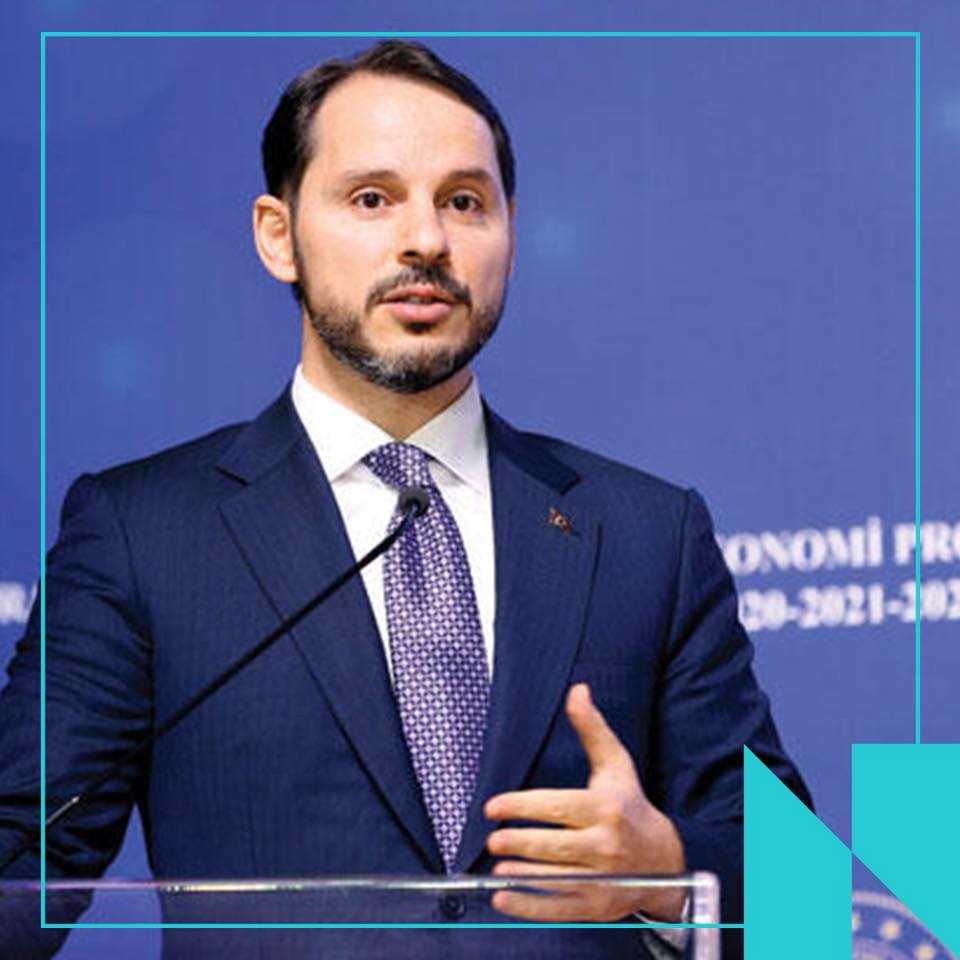
The Turkish treasury and finance minister Mr Albayrak said the Turkey`s priority in 2020 will be stabilizing the inflation rate to single digits.
The government will be mainly working on improving the production and quality of the Turkish goods and services.
Albayrak declared after the Turkish Statistical Institute announced that the country’s inflation rate last month was 11.84%.
With reference to the country’s export figures for 2019, Albayrak said that the government will continue to back producers and allocate resources for growth based on exports and value-added production.
Turkey’s exports rose 2.04% year-on-year to reach $180.46 billion in 2019, hitting a historic high, Trade Ministry data showed.
Turkey’s central bank decreased the interest rates

Turkey’s central bank came with a significant cut in the interest rates from 24% to 19.7% to boost economic activity in the country, this came after a meeting in the central bank chaired by the new president of the central bank Mr Murat Uysal, While experts primarily expected that this cut will increase the Turkish economy especially the real estate sector that is offering higher return on Investment from the banks.
New mega highway project between Istanbul and Izmir
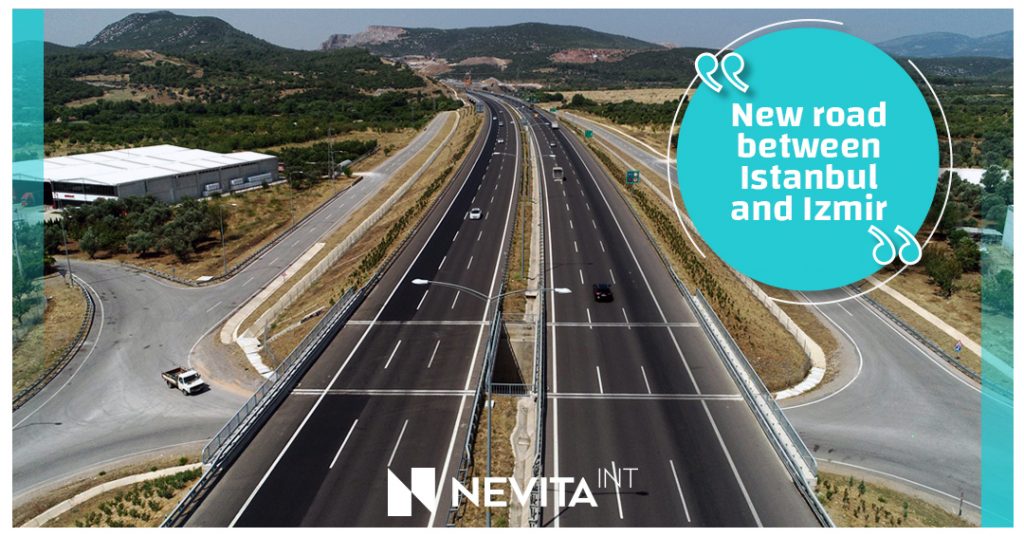
The president of Turkey Recep Ordogan cut the ribbon on a new mega highway project between Istanbul and Izmir, a project that will decrease the travel time between the two cities by more than half, the trip used to take 8 hours now it will take around 4 hours, the road is 192 kilometres long and is considered an extension for Sultan Selim bridge that was established in 2016, the project will widely contribute in increasing the trade and facilitating the movement between the two cities.
Istanbul Airport, one of the largest airports in the world
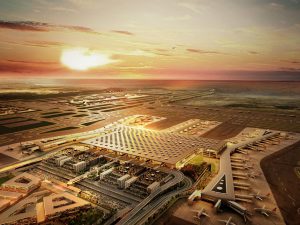
Istanbul airport is one of the major current projects, which Turkey has inaugurated in 2018. According to Anadolu Agency, Istanbul airport is expected to launch 2000 flights daily to more than 350 destinations, hosting 90 million passengers by the end of 2018.
Furthermore, the completion of the airport is expected by the end of 2028, handling up to 200 million passengers.
The company, which has taken the responsibility of constructing the new airport, announced that in the beginning, Istanbul airport will be prepared with three runways, however, by 2018, it would be equipped with six runways. The location, where this project is launched, spreads over an area of 76.5 million square meters, with an estimated cost of $12 billion.
This investment initially is expected to achieve more than $30.65 billion at the end of 2018, not mention its importance of the strategic location with this huge capacity, which might be competitive over the other world’s top airports.
The Istanbul airport has won the first prize in the” Future projects and infrastructure” at The World Architectural Festival in Berlin for its outstanding design in 2016.
Also, it is worth mentioning that our projects in Başakşehir are so close to Istanbul airport in which you can be there in less than 20 minutes.
The recent Turkish lira crisis

Turkey has experienced a high depreciation in its currency, in which Turkish lira has lost more than 35% of its value this year, hitting the lowest record of 6.88 against the US dollar. This unprecedented lira’s depreciation began days after the announcement of US president Donald Trump about doubling the tariffs of steel and aluminum imports from Turkey.
In the recent 15 years, Turkey as a developing country has witnessed high levels of long and short run capital inflows including direct investments, which in turn push the economy toward high economic growth rates and promote the Turkish labor market throughout maintaining low unemployment rates.
However, this heavy loans dependence and the high deficit in the current account, which continues progressively since several years along with the latest political problems, put more pressure on the economy, causing higher inflation rate and weaker the Turkish lira.
Consequently, the Turkish government has taken several serious measures in which the finance minister of the Turkish government, Albayrak recently unveiled a new economic program aimed to stop the financial crisis, promising to tame the depreciation in Turkish lira.
Due to the coordination between both fiscal authority and the central bank, the decision of raising the interest rate regularly up to 24% has played the main role in recovering the economy, bringing the exchange rate back to stable levels.
Istanbul İkitelli City Hospital
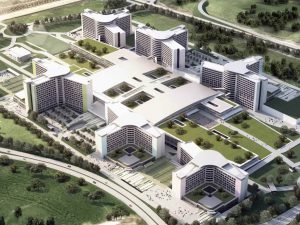
Istanbul İkitelli City Hospital Project is the 3rd largest healthcare project in Turkey under Public Private Partnership agreement proposed by the Ministry of Health. This huge health project is located in Başakşehir, serving the European side of Istanbul with capacity of 2682 bed. It is expected to be completed in 2020 with area of 1.000.000 m2 which is very huge.
The City hospital project is surrounded with many public facilities such as Yavuz Sultan Selim Bridge, TEM access roads, and the planned subway route which provide the residents of Istanbul and its neighboring provinces with an easy access to the project.
Istanbul İkitelli City Hospital Project will provide health services for 60.000 visitors per day, employing almost 9500 workers; doctors, nurses and administrative employees.
The Istanbul İkitelli City Hospital involved Main Hospital with 2,682 beds, Physical Therapy and Rehabilitation Hospital with 200 beds, and Psychiatric Hospital with 128 beds.
The main hospital includes 6 buildings with a shared core building, the hospitals are:
-General Hospital with a bed capacity of 469
-Cardiovascular Diseases Hospital with a bed capacity of 327
-Neurology and Orthopedics Hospital with a bed capacity of 311
-Children’s Hospital with a bed capacity of 521
-Gynecology Hospital with a bed capacity of 359
-Oncology Hospital with a bed capacity of 367
Yavuz Sultan Selim Bridge
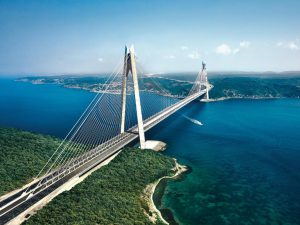
Yavuz Sultan Selim Bridge has become one of the most iconic infrastructure projects in Turkey, linking between the European and Asian sides of Istanbul which is one of the most important transit in Turkey.
Yavuz Sultan Selim Bridge is one of the tallest bridges in the world with length of 2,164 meters, and one of the world’s widest suspension bridges with width of 58,4 meters. The bridge is located near the Black Sea entrance between the European and Asian sides, which called the Third Bosphorus Bridge.
It is built for both rail and motor vehicle transit, carrying eight motorway lanes and two railway line in each direction, and it is expected to serve over 270,000 vehicles daily for both directions with crossing fees of 3 $ for cars and 15 $ for trucks.
It was opened officially in August 2016 in a huge ceremony, which was attained by the Turkish President Recep Tayyip Erdoğan and many Presidents and Prime Minsters of the neighboring countries.
The bridge is constructed by Turkish company İçtaş and the Italian company Astaldi, under budget of 4.5 billion TRY, which is about 2.5 billion USD. Yavuz Sultan Selim Bridge is designed by the Swiss engineer Jeaand and the French structural engineer Michel Virlogeux from T-ingénierie, involving two years of design studies and two years of works around the clock seven days a week to end it.
Moreover, the officials have declared that the bridge will reduce the traffic congestion in Istanbul, declining the fuel costs and saving people time. In terms of the project’s economic contribution, its construction accounts for 6 % of output, employing 2 million people.